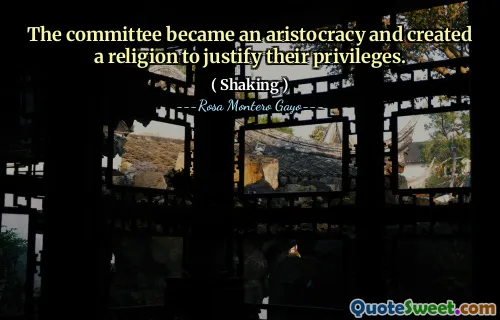
The committee became an aristocracy and created a religion to justify their privileges.
This quote offers a sharp critique of how power structures often evolve beyond their original purposes. When a governing body or ruling group begins to view itself as an elite caste, it risks losing sight of the broader societal interest. Instead of serving collective needs, such groups may start to cement their privileges and entitlements, fabricating ideologies or doctrines—akin to a religion—to legitimize their preferential status. This phenomenon is visible throughout history in various forms, from political factions to corporate hierarchies.
The creation of a 'religion' to justify privileges underscores how ideologies can be manipulated as tools of control. They aren’t merely of spiritual or moral significance but become instruments that reinforce existing power. The natural human tendency to seek stability or protect one's status can lead such groups to construct narratives that defend their dominance, often at the expense of fairness or equality.
This process can also serve to deepen societal divides. When privileges are justified through constructed beliefs, challenging or changing the status quo becomes more difficult—those who hold power become protectors of their institutions, and dissenters are silenced or marginalized. Such dynamics hinder social progress and can create resilient social stratification.
Recognizing this pattern is crucial in resisting unmerited privilege, promoting transparency, and fostering societies rooted in equality and accountability. Historical and contemporary examples serve as a reminder that vigilance and critical thinking are necessary to prevent societies from descending into rigid hierarchies where privileges are unjustly maintained under the guise of tradition or belief.






